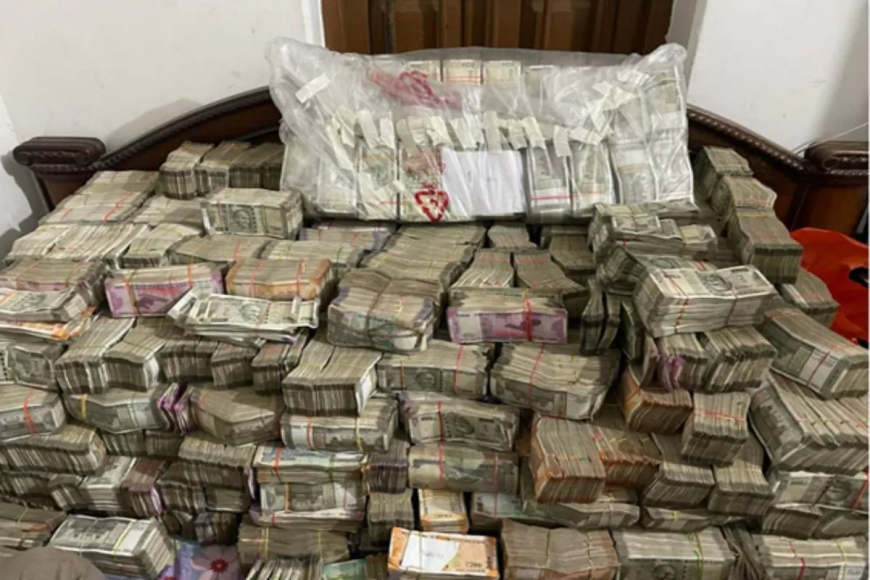Inside India's Billion-Rupee Frauds of 2025: The Power, Politics, and ED's Relentless Pursuit
A deep dive into India’s billion-rupee financial frauds of 2025, with details on ED raids, political links, and legal proceedings.

India’s financial ecosystem is facing a credibility crisis as multiple high-profile billion-rupee fraud cases have come to light in 2025. With the Enforcement Directorate (ED) intensifying raids across corporate and political corridors, a storm is brewing—one that is shaking the very foundation of public trust in institutions.
From shell companies and fake invoices to foreign tax havens and political connections, this year’s cases have one thing in common: sheer scale and deep-rooted complicity.
₹4,300-Crore Scam: The Realty Giant Under Scrutiny
In early April, the ED launched a series of raids on Varsha Realty Group, one of India’s fastest-growing construction conglomerates, following allegations of misappropriation of investor funds, inflated land deals, and round-tripping through overseas shell entities.
According to The Economic Times, the company diverted over ₹4,300 crore into offshore trusts registered in Dubai and the British Virgin Islands. Fake subcontractor invoices were used to show inflated project costs, allowing them to siphon funds quietly.
The ED has attached assets worth ₹1,200 crore so far, including land parcels in Maharashtra and luxury properties in Delhi NCR. The group’s chairman, Ajay Khandelwal, is under house arrest, and the CBI is pursuing charges under the Prevention of Money Laundering Act (PMLA).
₹1,700-Crore Startup Fraud: Fintech Gone Rogue
In a case that rattled India’s booming startup ecosystem, Zeepay Technologies, a fintech unicorn once celebrated for its rapid growth, has been accused of manipulating investor valuations, forging payment gateway licenses, and misreporting user growth data.
A forensic audit by SEBI and subsequent investigation by the ED exposed over 70 shell accounts used to simulate transactions and inflate monthly active users (MAUs). The fraud duped investors—including two major international venture capital firms—of nearly ₹1,700 crore.
Moneycontrol’s investigation revealed that the startup’s CTO and CFO fled the country in March, prompting the issuance of a Red Corner Notice by Interpol.
The Political Angle: Allegations and Countercharges
These frauds haven’t remained confined to boardrooms. Several political figures, both in power and opposition, have found themselves named in ED charge sheets, either as alleged beneficiaries or silent enablers.
One of the most controversial developments involves a sitting Member of Parliament (name withheld for legal reasons), allegedly linked to offshore accounts traced back to Zeepay’s transactions. The ruling party claims it is a testament to their anti-corruption stance, while the opposition calls it “selective targeting of political dissent.”
Legal experts note that ED’s recent activity has coincided with the pre-election political climate, which raises questions about whether enforcement is being used for both justice and leverage.
“While the investigations are valid, the timing suggests an undercurrent of political maneuvering,” said Prashant Malhotra, a former Additional Solicitor General, in an interview with Bar & Bench.
How the ED Is Cracking Down
So far in 2025, the ED has conducted over 380 raids, attached assets worth ₹15,000 crore, and filed prosecution complaints in 42 major cases, according to their official quarterly update on the Directorate of Enforcement portal.
The agency has adopted advanced forensic tools to track cryptocurrency transactions, often routed through decentralized wallets. They are also collaborating with international agencies like the Financial Action Task Force (FATF) and Interpol to expedite extraditions and cross-border seizures.
For example, Operation Clean Ledger, a multi-agency initiative launched in February, successfully froze 112 digital wallets linked to laundering proceeds from the Zeepay case.
Legal Proceedings: Slow, But Moving
While ED raids make headlines, convictions remain rare. Legal proceedings have begun in many of the 2025 cases, but India’s overburdened court system remains a bottleneck.
In the Varsha Realty case, the Bombay High Court has directed weekly status updates and denied anticipatory bail to key accused. In contrast, the Zeepay matter is being fast-tracked under a special bench in Delhi, with the next hearing scheduled for July 1.
The Supreme Court has also taken suo motu cognizance of delays in high-value economic offenses and asked the Ministry of Law and Justice to propose reforms to expedite trials.
Impact on Markets and Policy
These revelations have triggered market jitters, especially in the real estate and fintech sectors, where investor confidence has dipped significantly. Regulatory bodies like SEBI and RBI have proposed tighter disclosures, especially for startups seeking IPOs or international funding.
Policy think tanks like NIPFP and ORF have also called for structural reforms in financial governance, including mandatory third-party forensic audits for companies above a certain valuation threshold.
Conclusion
India’s billion-rupee scams in 2025 offer a stark reminder: fraud is no longer the domain of backroom deals. It is orchestrated through sophisticated corporate structures, powered by global financial networks, and often protected by political insulation.
But this year may also mark a turning point. The aggressive stance of enforcement agencies, the increasing role of forensic finance, and growing public pressure could finally break the cycle of impunity. Whether justice will be swift remains uncertain—but what is clear is that the era of quiet corruption is being loudly disrupted.














